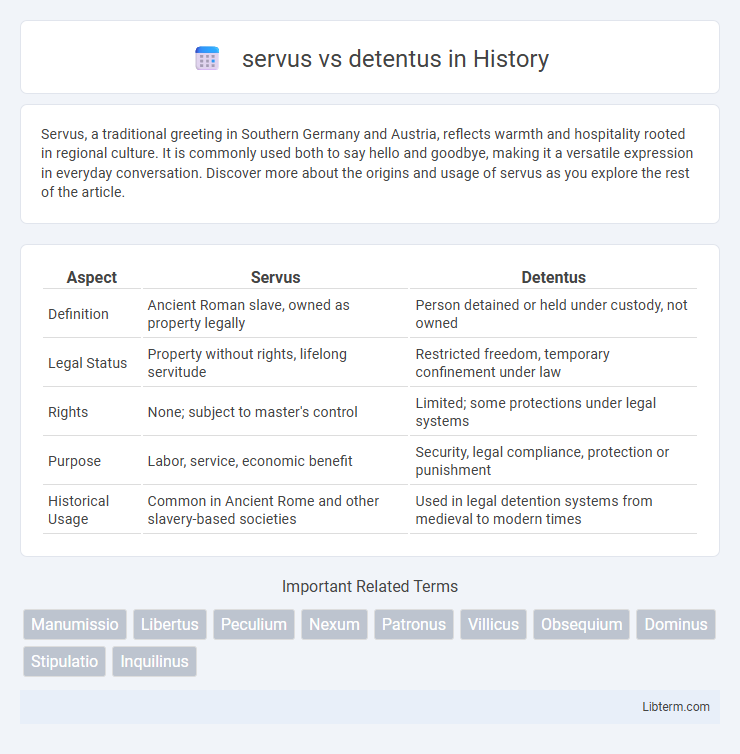Servus, a traditional greeting in Southern Germany and Austria, reflects warmth and hospitality rooted in regional culture. It is commonly used both to say hello and goodbye, making it a versatile expression in everyday conversation. Discover more about the origins and usage of servus as you explore the rest of the article.
Table of Comparison
| Aspect | Servus | Detentus |
|---|---|---|
| Definition | Ancient Roman slave, owned as property legally | Person detained or held under custody, not owned |
| Legal Status | Property without rights, lifelong servitude | Restricted freedom, temporary confinement under law |
| Rights | None; subject to master's control | Limited; some protections under legal systems |
| Purpose | Labor, service, economic benefit | Security, legal compliance, protection or punishment |
| Historical Usage | Common in Ancient Rome and other slavery-based societies | Used in legal detention systems from medieval to modern times |
Introduction to Servus and Detentus
Servus and detentus are important legal concepts in property law, defining different types of possession and control over goods. Servus refers to a person who has actual physical control and ownership rights over an item, granting full possession and legal authority. Detentus, on the other hand, indicates a person who holds or controls an object without ownership rights, often in a custodial or temporary capacity.
Etymology of Servus and Detentus
The term *servus* originates from Latin, meaning "slave" or "servant," reflecting a legal and social status in ancient Rome tied to ownership and subjugation. *Detentus* derives from the Latin verb *detinere*, meaning "to hold back" or "to detain," indicating a state of being restrained without full ownership, often used in legal contexts distinguishing possession from slavery. The etymology highlights the difference between *servus* as a condition of enslavement and *detentus* as temporary or conditional physical control.
Historical Context of Servus in Ancient Rome
The term "servus" in Ancient Rome specifically designated a person legally owned as property, forming the foundation of Roman slavery systems essential to the empire's socio-economic structure. Unlike "detentus," which referred to someone held temporarily or under less formal constraints, servus status was hereditary and deprived individuals of basic civil rights, legitimizing their use in agriculture, households, and public projects. Roman law codified servus as a class pivotal to imperial expansion and urban development, highlighting its entrenched role in shaping Roman society.
The Legal Status of Detentus
Detentus refers to an individual held in custody without formal legal ownership, contrasting with servus, who is considered property under Roman law. The legal status of detentus is characterized by passive possession, meaning they are detained without the rights and obligations tied to servitude. Unlike servus, detentus lacks personal status as a slave and is often subject to different protections and limitations in legal claims of ownership or control.
Key Differences Between Servus and Detentus
Servus refers to a person held in complete bondage with all personal rights transferred to the master, effectively considered property. Detentus indicates someone detained or held in physical custody without full loss of legal personhood or rights. The key differences lie in the extent of control, with servus subjected to absolute authority and detentus experiencing limited, temporary restraint without ownership implications.
Social Roles and Daily Life of Servus
Servus in ancient Rome functioned primarily as household slaves, performing a wide range of domestic tasks such as cooking, cleaning, and childcare, which positioned them at the core of daily family life. Their social role was deeply integrated into the urban and rural settings where they lived under the authority of a dominus, reflecting a structured but dependent existence with limited personal freedom. Unlike detentus, who were often held temporarily and under different legal circumstances, servus experienced lifelong servitude that shaped their identity and social interactions within Roman society.
The Conditions and Rights of Detentus
Detentus refers to a person deprived of liberty without formal legal recognition as a prisoner or detainee, often lacking official documentation or charges. The conditions of detentus typically include indefinite confinement without due process, limited access to legal representation, and minimal rights protection under international human rights law. Rights of detentus emphasize the necessity for humane treatment, prompt judicial review, and safeguards against arbitrary detention to prevent violations of personal freedom.
Evolution of Servus and Detentus Over Time
The evolution of servus (slave) and detentus (detainee) reflects significant shifts in legal and social frameworks, marked by servus primarily rooted in ancient Roman law signifying total ownership, while detentus emerged in modern contexts emphasizing restricted liberty without full ownership. Over time, servus transitioned from chattel slavery to more regulated forms of servitude, influenced by abolition movements and human rights developments. Detentus increasingly involves legal protections and procedural safeguards, reflecting evolving norms around personal freedom and state authority.
Impact on Roman Law and Society
Servus and detentus represented distinct legal statuses in Roman law, where servus referred to a slave with no personal rights, while detentus described an individual held in custody without the full implications of slavery. The differentiation influenced property rights, as servus were considered res (things) subject to ownership, whereas detentus maintained some degree of personal freedom, affecting legal responsibilities and social interactions. This distinction shaped societal perceptions of control and autonomy, reinforcing hierarchical structures and the legal framework governing personal liberty in ancient Rome.
Legacy of Servus and Detentus in Modern Discourse
Servus and detentus represent distinct forms of servitude in Roman law, with servus indicating outright slavery and detentus denoting custody without full ownership. The legacy of servus profoundly influenced modern human rights concepts by highlighting the inhumanity of chattel slavery and inspiring abolitionist movements. Detentus informs contemporary legal distinctions between possession and ownership, shaping property law and detention policies in modern jurisprudence.
servus Infographic

 libterm.com
libterm.com